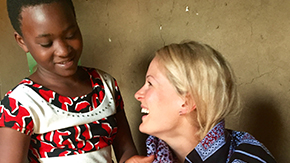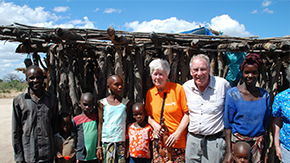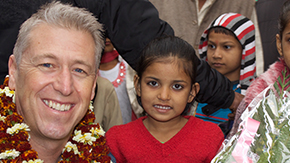Katie, the Sponsor Visits Manager for World Vision UK, reflects on her exciting time spent visiting her two sponsored children Mikael and Bahati in two communities in central Tanzania.
My jam-packed week began with a visit to the ‘cow-dip’ project which is funded by UK sponsors. The hundreds of livestock enter a quiet and shaded grass area like a cow-spa retreat, starting with drinks being served in the large agricultural troughs, followed by being brushed, and then entering a ‘jacuzzi’ if you like, of chemical treated fluid which kills all parasites and fleas, which have troubled the livestock in the area for years. The fleas suck the animals’ blood, leaving them weak and causing many deaths which leave the farmers in very vulnerable situations. As the long line of cows left the dip, I should have known better, but peering in to get a closer look, the cows shook residue all over me, a very amusing sight for the more knowledgeable local children!
 Before the official opening, I was welcomed to share some words of encouragement to the crowds of local livestock keepers and children, on behalf of the UK sponsors. It was clear that the community, who also donated to the cost of building the dip, are already so proud of it, and that the benefits reach to even the surrounding villages as cows and goats are brought from afar. In fact, I came away even more inspired by their excitement but also impressed by their plans to find their own funding to cover the building of a security cabin and to fund a guard who will protect the chemicals and patrol the cow dip. The livestock holders were truly humbled by the provision of the cow dip and they spoke about how relieved they will be when their cattle thrive, and their profit can mean they can help support their own children with school fees in the future.
Before the official opening, I was welcomed to share some words of encouragement to the crowds of local livestock keepers and children, on behalf of the UK sponsors. It was clear that the community, who also donated to the cost of building the dip, are already so proud of it, and that the benefits reach to even the surrounding villages as cows and goats are brought from afar. In fact, I came away even more inspired by their excitement but also impressed by their plans to find their own funding to cover the building of a security cabin and to fund a guard who will protect the chemicals and patrol the cow dip. The livestock holders were truly humbled by the provision of the cow dip and they spoke about how relieved they will be when their cattle thrive, and their profit can mean they can help support their own children with school fees in the future.
From here we went off to hunt for honey. We met with a group of men who have received training from World Vision on how to make their own bee hives, from local materials. To help attract the bees, they have grouped together and received loans from World Vision to grow sunflowers for sunflower oil, which is very profitable, especially as they are near a main highway through the country so there is plenty of passing trade. Fortunately for me, they provided us with bee-keeping suits which were surprisingly cool despite the 28 degree heat. Slowly and calmly approaching the bee hives, I hung back and let the men show me the opened hives. 
Honey is harvested every two months, and an incredible 40 kilos is produced per bee hive. The men have already made 25 wooden hives, so I look forward to visiting later this year and trying the final product. The men had high hopes, and so they should.
The group had made it a priority to use some of their profits to buy school text books for needy children in the village.
I had a short time visiting Mikael, one of my two sponsored children, which we spent drawing pictures together- he was proud to teach me to draw some local flowers and went on to show me his impressive school books. We shared a bowl of ugali- a stiff maize porridge with some spinach, and lots of laughter was had by all.
Heading off to another UK sponsored ADP, three hours away, we were welcomed by my second sponsored child Bahati. It was a humbling experience, sitting with his whole family, around 11 people, including Babu (granddad) who had walked miles back home from his allotment to greet me.
We excitedly got to know one another, and I quickly felt at ease and part of the family
I won’t forget their welcoming and warm nature or the delicious bowls of peanuts and boiled sweet potato we ate that Bahati’s grandpa had grown behind their home.

An unforgettable afternoon was spent with the village nutrition committee (a very energetic bunch!) You might remember our focus on nutrition and health last year, and sending a balancing game to your sponsored child, or a card encouraging mothers to feed their children a more nutritious selection of foods. The group worked with Nurse Sarah from the local clinic, which is funded by our sponsorship donations, to highlight the 40 children most vulnerable to malnutrition. With training from World Vision, the group worked in educating and helping those families by teaching them to produce a simple mix of different flours to make their daily staple food, ‘ugali’, rather than just maize. The new mix has peanut/sorghum/maize/sweet potato and cassava flour which is 10 times better for children. Not only have they incredibly reduced the number of malnourished children from 40 down to zero, but they have failed to sell the flour because all of the villagers heard about the new flour and have replicated the recipe themselves! Both children and adults in the area are now enjoying the nutritious blend- and local mothers alongside Nurse Sarah, are delighted by the result.
After a busy few days getting to know so many wonderful people, children and staff, it was sad to say farewell. I came away truly inspired by how the communities have partnered with World Vision, not accepting hand outs but really taking it on themselves to change their own situations. Why don't you make the journey to your sponsored child's community to visit them and see more of how your donations are being put to great use. Find out more about visiting your sponsored child »





